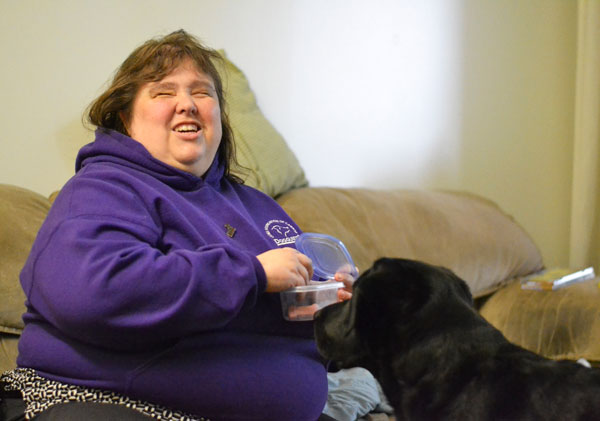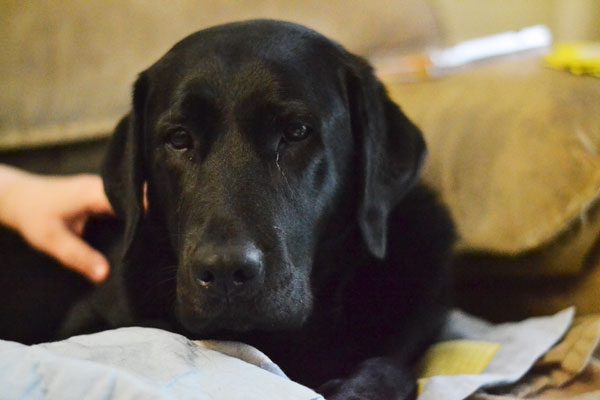
“(Kerry) will be treated with respect. I don’t care if you like dogs or hate dogs.”
– Amanda Ehlert
Prince Albert’s Amanda Ehlert lives independently with the help of her guide dog named Kerry.
At 38 years old, Ehlert has been dealing vision loss for her whole life. She only had 10 per cent of her sight until she went completely blind over 11 years ago.
Kerry, a five-year-old black lab, is trained to help her get on the bus and find a seat, warn her when she’s nearing a flight of stairs and make sure she stays on the sidewalk.
Ehlert had another guide dog before Kerry named Freedom, a suitable name for the golden retriever.
She retired Freedom and was living without a guide dog for a few months.
“Christmas Eve of ’15, I was trying to get to the city centre branch of Credit Union just with my cane. (I) didn’t realize it until a kind lady stopped to tell me I had veered off so far that I was in the middle of 1st Avenue. Very scary, and it was my first Christmas in years without Freedom,” she explained.
“I got to the teller’s desk and I just completely melted, I just completely had a meltdown.”
Ehlert is stern if anyone tries to tell her the dog can’t come into a business, like one time when she went to a buffet for lunch with her mother and sister.
“The hostess tried to tell us that she had to wait in the car, and I think mom knew that I was all gung-ho and ready to prove my point, so she sort of took over and said ‘No, she’s coming in. She’s allowed, she’s coming in.’ And (the hostess) insisted three, four, five times (that) the dog can’t come in,” she recalled.
For Guide Dog Awareness Month this September, the CNIB Foundation is stressing that ‘Guide dogs belong everywhere. It’s the law.’”
Guide dogs are listed as a service animal under the Saskatchewan Human Rights Code.
“Businesses are required to accommodate for the attendance of service animals. Access to hotel accommodations, public services and facilities must be provided to persons with service animals,” states the Saskatchewan Human Rights Commission (SHRC).
Christall Beaudry, the executive director of the CNIB Foundation, said their campaign includes giving free window decals to businesses that read ‘Guide dogs welcome.’
“Many times our clients are turned away in public establishments because they have a guide dog,” she said.
Beaudry feels this is because people aren’t aware of the difference between service animals, therapy animals and emotional support animals.
The SHRC says pets, therapy animals and emotional support animals are not allowed in public places.
“It’s amazing to see every day the level of independence that someone has with a tool like a guide dog or a white cane, so a guide dog is really an extension of the person. It just provides that added independence and safety for someone to be able to navigate around in (their) community,” said Beaudry.
Ehlert and Kerry were cozied up in their apartment on a rainy Tuesday.
Kerry showed her calm, laid back personality sitting by Ehlert’s feet. She follows her around the home, getting especially excited when Ehlert grabs the treat container.

When they’re out in public, Ehlert said people will often try to pet Kerry and give her treats.
“Even without the harness, I’ve started to tell people ‘Ask before you pat,’” she said. “She’s not vicious, there’s no reason to be afraid of her, but some other dogs are not as laid back and if you were to reach down and pet another dog, you might not be so fortunate.”
Ultimately, she said it’s important that her guide dog gets treated with appreciation.
“She will be treated with respect. I don’t care if you like dogs or hate dogs.”
This especially applies from those working in businesses.
Ehlert expressed how she feels knowing that so many handlers are getting sent away from businesses because of something that gives them safety and freedom.
“These dogs, especially once you’ve had them for any length of time, they’re a part of the family as well as being a mobility aid. It makes me feel angry,” she said.
The CNIB Foundation in Regina just received a litter of guide dog puppies last month. Beaudry said they’ll be training them for the next 10 to 15 months, before they move on to advanced training and are matched with a handler.
For more information on their campaign for Guide Dog Awareness Month, visit www.guidedogchampions.ca.

